The Science of Body Preservation: Understanding Refrigeration
When someone passes away, time becomes a critical factor. Proper preservation through refrigeration isn't just a technical necessity—it's an essential part of treating the deceased with dignity. When a body in refrigerator situation arises, whether at a funeral home or medical facility, understanding the science behind preservation makes all the difference.
The human body begins natural decomposition processes immediately after death. Cooling the body slows these processes significantly by reducing bacterial activity and enzymatic reactions. Here's what professionals consider when managing body preservation:
| Body Refrigeration Basics | Details |
|---|---|
| Optimal Temperature | 2°C to 5°C (35°F to 41°F) |
| Maximum Storage Time | Up to one week before advanced decomposition |
| Humidity Requirements | Approximately 85% |
| Proper Equipment | Dedicated mortuary refrigerator (not household units) |
| Legal Storage | Only by licensed funeral homes, hospitals, or medical examiners |
Maintaining the right temperature window is crucial—too cold and tissue damage occurs, too warm and decomposition accelerates. The ideal 2-5°C range effectively balances preservation needs while preventing freezing damage to tissues that would complicate embalming or autopsy procedures later.
Humidity control around 85% helps prevent dehydration of tissues, which can alter appearance and compromise dignity. This delicate balance requires specialized equipment that household refrigerators simply cannot provide, despite what crime dramas might suggest.
I've worked with countless funeral directors who understand that proper refrigeration isn't just about temperature—it's about creating the right environment for temporary preservation while families make arrangements and say goodbye on their own timeline.
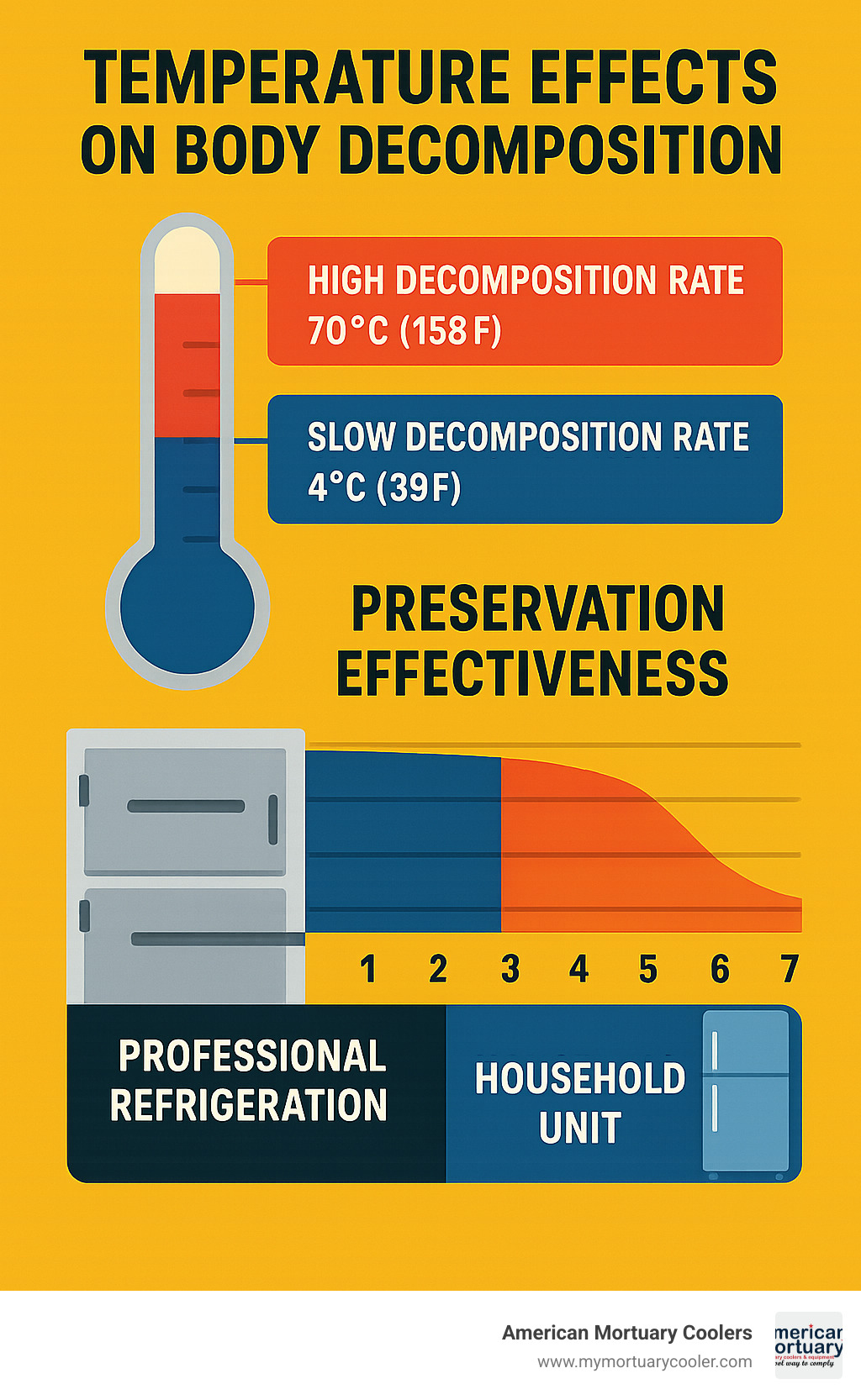
At American Mortuary Coolers, we design our systems with these scientific principles in mind. Each unit precisely controls temperature and humidity while providing the durability needed in sensitive environments. We understand that when a body in refrigerator situation is necessary, both technical performance and respectful handling matter deeply.
The preservation window is limited—typically one week before more permanent preservation methods become necessary. This timeline gives families precious days to gather while ensuring the deceased remains in a dignified state. It's a balance of science and compassion that defines quality mortuary care.
For those working in death care, understanding the connection between morgue drawers, mortuary chambers, and funeral home refrigeration systems helps provide better service during life's most difficult moments.
Our Tennessee-based team takes pride in crafting custom solutions that honor both the science of preservation and the emotional needs of families across all 48 contiguous states. Because when it comes to caring for those who have passed, both technical excellence and human compassion matter deeply.
How Refrigeration Slows Decomposition
When life ends, our bodies begin a journey of change. Without the heartbeat that circulates blood and the metabolism that sustains our cells, the intricate systems that kept us alive start to break down. This natural process of decomposition begins immediately after death.
Refrigeration works like a pause button for these changes. When a body in refrigerator storage is kept at the ideal 2-5°C (35-41°F), several amazing preservation effects happen:
Cold temperatures dramatically slow down the enzymes that would normally break down tissues. Think of these enzymes as tiny demolition crews – refrigeration essentially puts them on break. The bacteria naturally present in our bodies, which multiply rapidly after death, also become sluggish or dormant when chilled.
"The science behind body cooling is fascinating," explains Dr. Michael Heintz, forensic pathologist who consults with American Mortuary Coolers. "We're essentially working with nature's own processes. Algor mortis – the natural cooling of the body after death – is something we improve and maintain through proper refrigeration."
Another crucial factor is humidity. Professional mortuary refrigerators maintain about 85% humidity – striking a perfect balance that prevents tissues from drying out while keeping mold growth at bay. This delicate balance is impossible to achieve in a standard household refrigerator.
Even at the cellular level, refrigeration makes a difference. ATP (adenosine triphosphate), often called the "energy currency" of cells, breaks down more slowly in cold environments. This delays cellular autolysis – essentially, the self-digestion of cells after death.
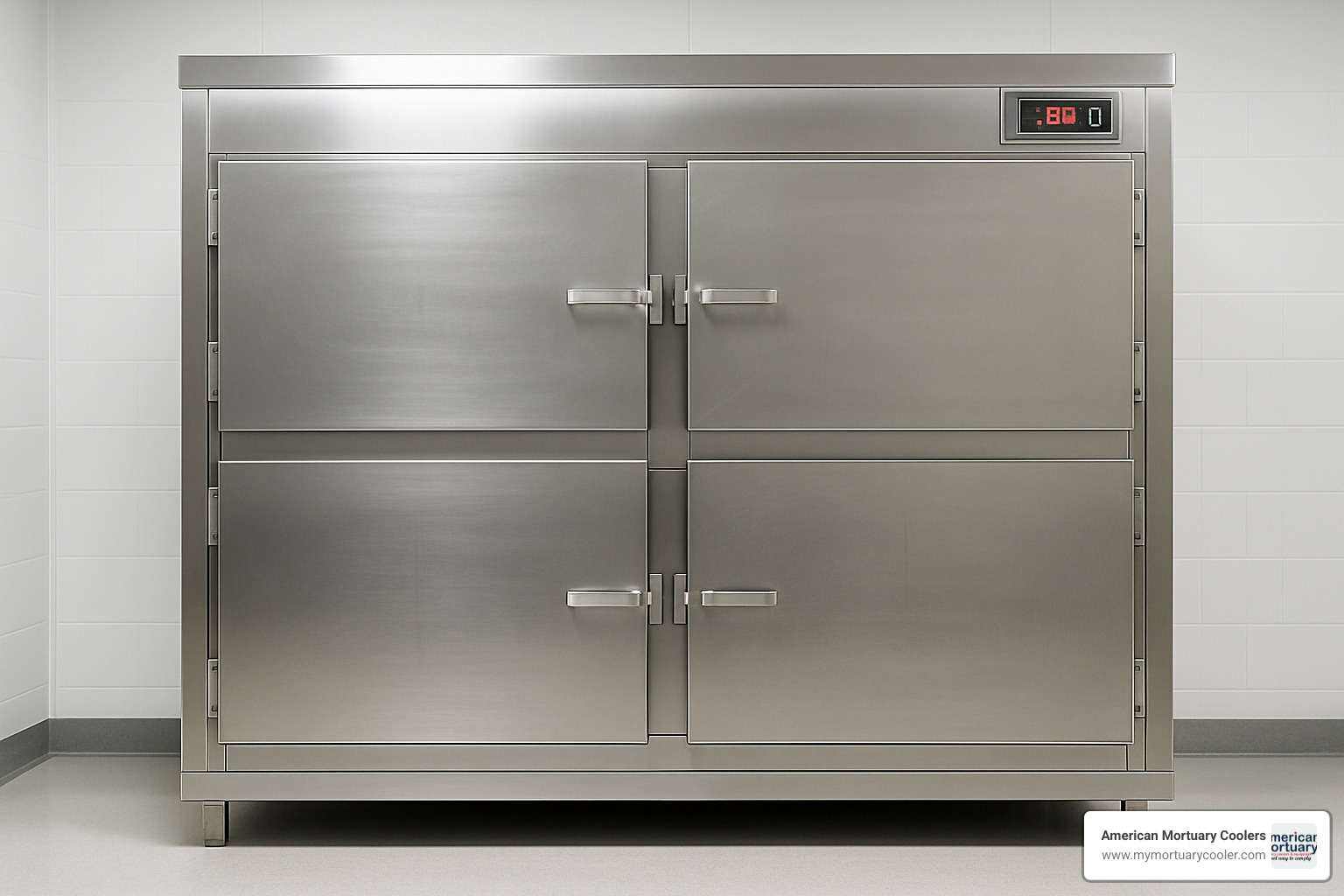
Home Fridge vs. Mortuary Unit
When news stories mention a body in refrigerator case, they typically involve household appliances used inappropriately. The differences between your kitchen fridge and a professional mortuary unit are substantial:
| Feature | Household Refrigerator | Professional Mortuary Cooler |
|---|---|---|
| Temperature Range | Variable (0-7°C typical) | Precise (2-5°C constant) |
| Temperature Uniformity | Poor (cold spots, door warming) | Excellent (even cooling throughout) |
| Humidity Control | None | Maintained at ~85% |
| Capacity | Not designed for human remains | 1-12 bodies depending on model |
| Insulation | Standard (R-value ~8-10) | Heavy-duty (R-value ~20-25) |
| Sanitation | Not NSF certified for biohazards | Meets strict NSF/UL sanitation standards |
| Air Circulation | Limited | Improved for uniform cooling |
| Alarm Systems | None | Temperature deviation alerts |
| Power Backup | None | Optional redundant power systems |
| Legal Status | Illegal for human remains | Compliant with funeral/medical regulations |
| Effective Duration | 1-2 days at most | Up to 7 days of proper preservation |
A heartbreaking case from 2020 highlights these differences. When a man finded a decomposed body in a freezer while clearing out his deceased mother's New York apartment, investigators believed the remains had been there for at least 10 years. Despite being frozen, decomposition was so advanced they couldn't immediately determine the person's gender.
"Household refrigerators are designed for leftover lasagna, not human remains," notes James Wilson from American Mortuary Coolers with gentle frankness. "They simply lack the specialized features that make proper preservation possible – consistent temperature, appropriate humidity, and proper air circulation are all missing."
Optimal Settings & Duration
For proper preservation in body in refrigerator storage, maintaining precise conditions is essential. Our professional systems are carefully engineered to create the perfect environment:
The 2-5°C (35-41°F) temperature window isn't arbitrary. Dip below 2°C, and ice crystals can form in tissues, damaging cells and making later embalming difficult. Creep above 5°C, and bacterial growth accelerates dramatically, speeding decomposition.
Even with perfect conditions, refrigeration buys limited time – typically about one week. After this window, noticeable decomposition occurs despite refrigeration, and embalming becomes necessary if viewing or further examination is required.
Humidity control at 85% prevents tissues from drying out while inhibiting mold. Professional units automatically maintain this balance, something impossible in standard refrigerators.
Good air circulation ensures uniform cooling throughout, preventing the problems of dry spots or condensation that can occur with irregular cooling.
A small funeral home in Johnson City, TN learned the importance of these settings firsthand. Struggling with frequent power fluctuations that affected their cooling systems, they installed an American Mortuary Cooler with backup power and digital monitoring. The result? Significantly improved preservation outcomes and peace of mind knowing that any temperature problems would trigger immediate alerts.
"Our units are designed with redundancy in mind," explains a technician from American Mortuary Coolers. "When you're responsible for preserving someone's loved one, there's no room for equipment failure."
More info about body storage freezers
Body in Refrigerator: Crime Headlines and Lessons
While our focus at American Mortuary Coolers is providing professional equipment for ethical and legal human remains preservation, we can't ignore the sobering reality that refrigeration equipment sometimes appears in criminal cases. Understanding these situations helps illustrate why professional standards and regulations are so vital in our industry.
In December 2024, a troubling findy made headlines when New Jersey State Police found human remains inside an abandoned refrigerator in Belleplain State Forest. Investigators identified the victim as Laura Hughes, a 50-year-old woman from Runnemede. Her boyfriend, Christopher Blevins, was later charged with first-degree murder after allegedly transporting the refrigerator containing her body to the remote location.
Court documents revealed "clear evidence of an effort to hide remains," with the body in refrigerator wrapped in a sleeping bag, secured with blue ratchet straps, and covered with carpet. Investigators tracked a green pickup truck carrying what appeared to be a "refrigerator-shaped object" using license plate reader data, which proved crucial to solving the case.
Another heartbreaking case emerged from Brooklyn in January 2024, when officers conducting a wellness check finded human remains stored in black bags inside a refrigerator and freezer. Detectives believe the body had been there for nearly two years. The victim had allegedly been killed over unpaid rent, with the perpetrator using a Leatherman tool for dismemberment before attempting to permanently seal the refrigerator by gluing its doors shut.
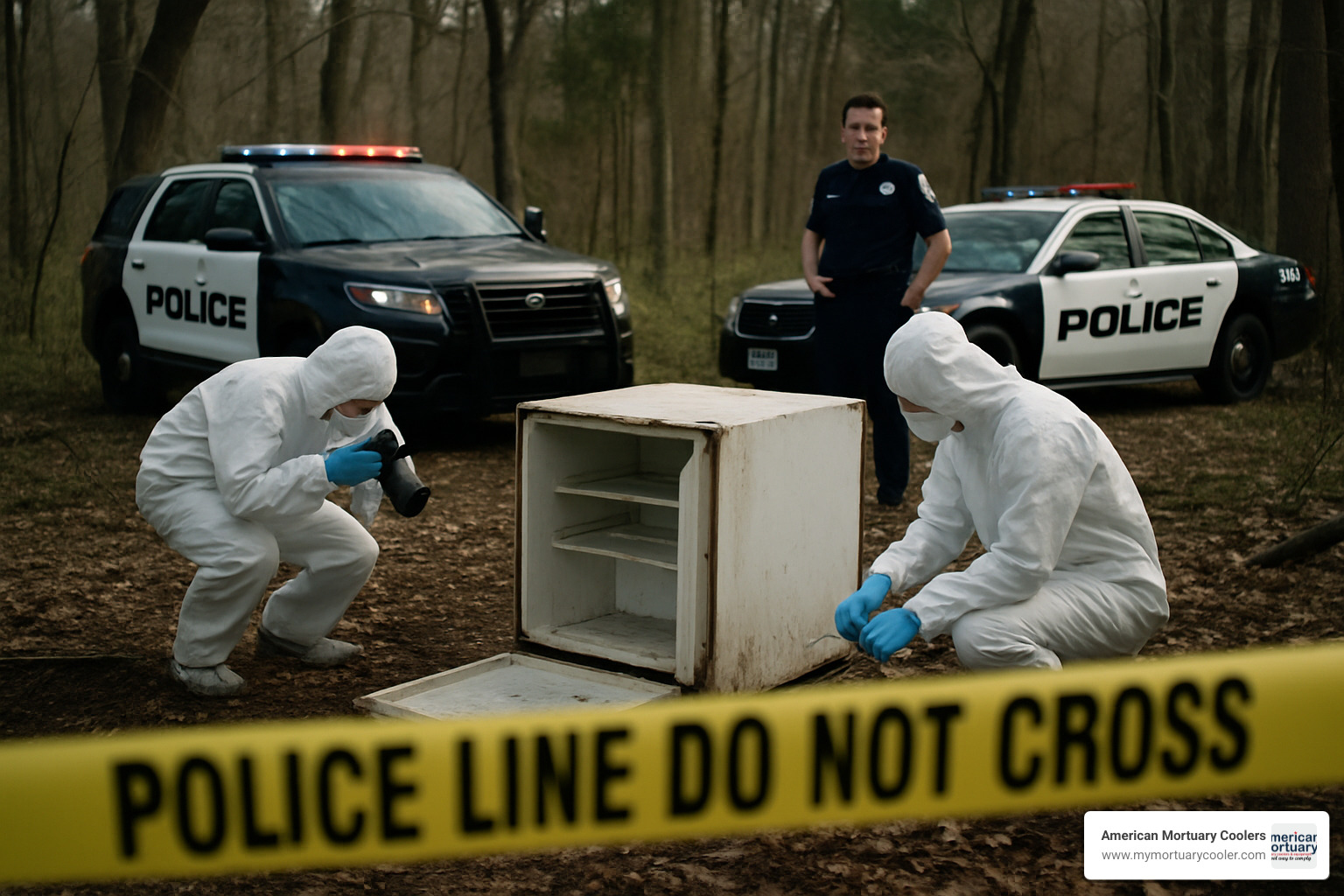
These cases, while disturbing, highlight several important lessons for both the public and our industry:
Household refrigerators inevitably fail at concealment – whether through odors, leakage, or mechanical breakdown, improper refrigeration cannot hide remains indefinitely. Professional mortuary refrigeration exists because proper preservation requires specialized equipment.
Despite concealment attempts, refrigerated remains often preserve crucial forensic evidence that helps investigators identify both victims and perpetrators – ironically, the very act of refrigeration sometimes provides the evidence needed for justice.
Modern investigative techniques continue to evolve, including license plate readers, cell phone tracking, and advanced forensics, making detection increasingly likely even in remote locations.
Community awareness matters tremendously, as many cases are finded through wellness checks, anonymous tips, or neighbors noticing unusual activities or odors.
Body in Refrigerator Motives
When examining criminal cases involving a body in refrigerator, certain patterns emerge regarding motives and relationships. Our research reveals several common scenarios that lead to these unfortunate situations.
Domestic violence escalation appears frequently in case reports. The Belleplain State Forest case followed this pattern, with victim and alleged perpetrator in an intimate relationship. This tragic progression from abuse to homicide represents one of the most common scenarios.
Financial disputes trigger many such cases, as seen in the Brooklyn incident where the conflict reportedly centered on rent payment, with allegations that the victim had been paying rent with drugs rather than money. Money problems—whether debts, inheritance, or living expenses—create dangerous tensions that sometimes end in violence.
Some refrigeration cases stem not from premeditation but from panic concealment after an unplanned homicide. In a particularly striking example from Egypt in 2014, a man kept his cousin's body in a freezer for 9 years after killing him, later claiming, "The crime was not planned and it happened in the heat of the moment."
Refrigeration is often chosen specifically to prevent detection by containing decomposition odors. As one perpetrator confessed according to court records, "He said he put her body in the refrigerator because he did not know what to do." This desperate attempt to buy time rarely works long-term.
Understanding these patterns helps inform both investigations and community awareness. It's worth noting that professional mortuary refrigeration equipment includes security features and documentation requirements specifically designed to prevent misuse, highlighting why proper equipment and protocols matter in legitimate settings.
Body in Refrigerator Find Methods
The findy of improperly stored remains follows several common patterns that demonstrate how difficult concealment ultimately proves to be:
Wellness checks initiate many findies, as in the Brooklyn case where officers conducting a routine check found human remains in a refrigerator and freezer. These checks, often requested by concerned family members or neighbors who haven't seen someone for an extended period, save lives and solve crimes.
In a 2023 Texas case, a man was arrested after his girlfriend's body in refrigerator was found during a search warrant execution. The investigation gained momentum when the victim's mother received information from the suspect's ex-wife and daughter – showing how family connections often break cases open.
Technology increasingly aids in findy too. In one New Jersey case, "After an extensive search of the area, a drone team from the Atlantic City Police and Fire Departments located a body matching the description." These advanced search methods complement traditional investigative techniques.
Perhaps most telling is how infrastructure failures often lead to findy. In the Egyptian case where a body remained hidden for 9 years, it was only found when "power outages caused the freezer to break down," revealing the remains. Mechanical breakdown represents nature's way of exposing what should never have been hidden.
Family clean-outs occasionally reveal long-hidden secrets. In a particularly unusual 2020 case, "a man found a decomposed body in a freezer while clearing out his dead mother's New York City apartment," with investigators suggesting the body had been stored for at least 10 years.
These findy methods remind us of a simple truth: improper refrigeration of human remains will eventually be detected, whether through mechanical failure, human intervention, or diligent investigation.
Legal Fallout & Sentencing
The legal consequences for individuals found guilty of concealing a body in refrigerator are appropriately severe and multi-layered. These cases typically result in multiple charges beyond the homicide itself:
First-degree murder charges are common when refrigeration was used to conceal a homicide, as seen with Christopher Blevins in the Belleplain State Forest case. The premeditation often demonstrated by the concealment effort frequently supports the most serious murder charges.
Desecration of human remains represents a specific charge addressing improper handling and storage of a body. In New Jersey, Blevins faced "desecrating human remains" charges alongside murder counts. This charge recognizes the dignity owed to the deceased even after death.
Tampering with evidence constitutes a serious felony that can carry substantial prison time even separate from homicide charges. Courts view refrigeration of remains as a deliberate attempt to interfere with proper investigation.
Hindering apprehension applies when actions specifically aim to avoid detection by law enforcement. In the Belleplain case, Blevins also faced these charges, reflecting the comprehensive approach prosecutors take.
Many perpetrators flee across jurisdictions after such crimes, triggering complex extradition processes. In one case, a suspect who fled to Mexico eventually surrendered in Mexico City and was returned to face charges – demonstrating that international borders provide less protection than criminals might hope.
The combination of these charges typically results in lengthy sentences. Even when homicide charges prove difficult to establish beyond reasonable doubt, the charges related to improper handling and concealment of remains often provide prosecutors with leverage for significant sentences.
At American Mortuary Coolers, we're committed to supporting the proper, dignified, and legal handling of human remains through professional equipment that meets all industry standards. Our refrigeration units are designed for licensed professionals who uphold the highest ethical standards in death care.
More info about body storage freezers
The Forensic Science Behind Cooling a Corpse
When it comes to preserving human remains, there's a fascinating science behind what happens in a body in refrigerator scenario. At American Mortuary Coolers, we've spent years studying how proper cooling preserves the crucial evidence that tells a person's final story.
Think of proper refrigeration as pressing the "pause button" on nature's decomposition process. This temporary preservation is vital not just for dignity, but for the scientific examination that often follows death.
The post-mortem interval (PMI) – the time between death and examination – is where refrigeration truly proves its value. A properly cooled body maintains evidence that would otherwise disappear rapidly, telling forensic experts important details about the person's final moments.
"When examining a properly refrigerated body, we're essentially looking at a snapshot closer to the time of death," explains Dr. Sarah Chen, a forensic pathologist who consults for our Northeast Region office. "Each degree above optimal temperature accelerates decomposition exponentially, potentially obscuring crucial evidence."
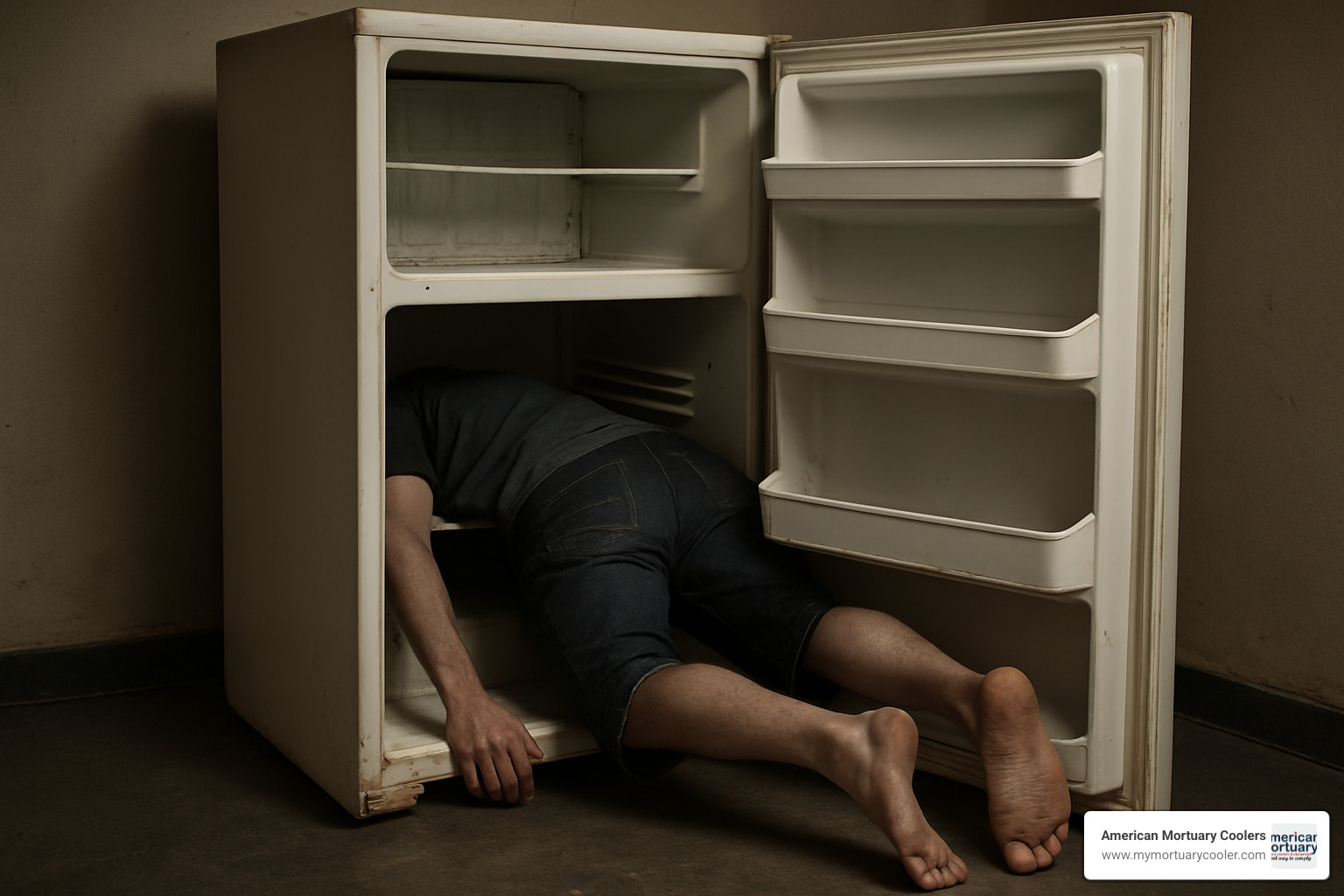
Professional cooling preserves several critical aspects of forensic evidence:
Tissue Histology remains more intact, allowing pathologists to examine cellular structures under a microscope. These tiny details can reveal important information about cause of death, pre-existing conditions, or when injuries occurred.
Toxicological Evidence is protected from rapid breakdown. Many drugs, poisons, and their metabolites degrade quickly during decomposition, but proper cooling maintains these chemical markers for accurate testing.
DNA Integrity stays more stable. While DNA is relatively hardy, decomposition can make extraction and analysis more difficult. Good refrigeration keeps DNA quality high for identification and family relationship testing.
Entomological Timeline considerations change with refrigeration. Cooling halts insect activity that forensic entomologists use to establish timelines. Experts must account for refrigeration periods when analyzing insect evidence.
We saw the importance of this when a county coroner's office in Pittsburgh upgraded to our precision cooling system with digital monitoring. Their previous unit had inconsistent temperatures that compromised evidence in a high-profile case. Now, their new system provides court-admissible documentation of preservation conditions – something that proved invaluable in a recent trial.
Scientific research on decomposition timing
Challenges After Prolonged Refrigeration
Even the best cooling technology has its limits. Extended storage – especially in improper refrigeration – creates significant challenges for forensic investigation when a body in refrigerator situation occurs.
Identity Confirmation becomes increasingly difficult as time passes. Physical features change, making visual identification harder or impossible. In the 2020 New York case, investigators couldn't even determine the sex of remains found in a freezer despite years of cold storage.
Cause-of-Death Masking is another concern. Refrigeration can obscure subtle tissue changes that would indicate how someone died. This is why medical examiners prefer examining bodies before refrigeration when possible.
The Microbial Environment shifts dramatically during extended cooling. The microscopic organisms present change over time, which complicates newer forensic techniques that use microbiome analysis to estimate time of death.
Toxicology Results may be compromised after long refrigeration. While cooling preserves many substances, certain compounds degrade even in cold conditions, potentially hiding evidence of poisoning or drug use.
Tissue Integrity suffers, especially in household refrigerators. Their automatic defrost cycles create freezing and thawing that forms ice crystals in cells, destroying subtle evidence of trauma or disease. One forensic pathologist described this to us as "like taking a sledgehammer to a crime scene."
These challenges highlight why proper equipment matters so much. For legitimate funeral homes and medical examiners, our professional systems with precise temperature control, backup power, and proper maintenance protocols prevent these issues – ensuring both dignity for the deceased and preservation of truth.
For criminal investigators dealing with improperly refrigerated remains, advanced techniques become essential. Fingerprint analysis (used in the Brooklyn case) and DNA testing often become the only reliable identification methods when visual recognition is no longer possible.
Choosing the Right Body Refrigerator for Lawful Storage
When it comes to storing human remains with dignity and care, choosing the right refrigeration equipment isn't just a practical decision—it's an ethical responsibility. At American Mortuary Coolers, we've guided countless funeral homes, medical examiners' offices, and hospitals through this important selection process.
"I remember working with a small-town funeral director who was absolutely overwhelmed by the options," says Robert Johnson, our Installation Specialist in Atlanta. "By the end of our conversation, he felt confident he was making the right choice for his community and the families he serves."
The first question we always ask is about capacity needs. Be honest about your typical case volume and potential surge scenarios. Our single and double-body units work beautifully for smaller funeral homes with limited space, while our three and four-body units are our most popular sellers for mid-sized operations. For medical examiners' offices or facilities in larger urban areas, our walk-in coolers provide the substantial capacity needed during normal operations and emergency situations.
Access configuration matters tremendously in daily operations. Roll-in designs allow staff to move gurneys directly into the unit—ideal for busy facilities handling multiple cases daily. Reach-in units save valuable floor space but require transferring remains to internal shelving. Many clients prefer our drawer systems that provide individual access to each set of remains without disturbing others—a feature families and staff both appreciate during viewing preparations.
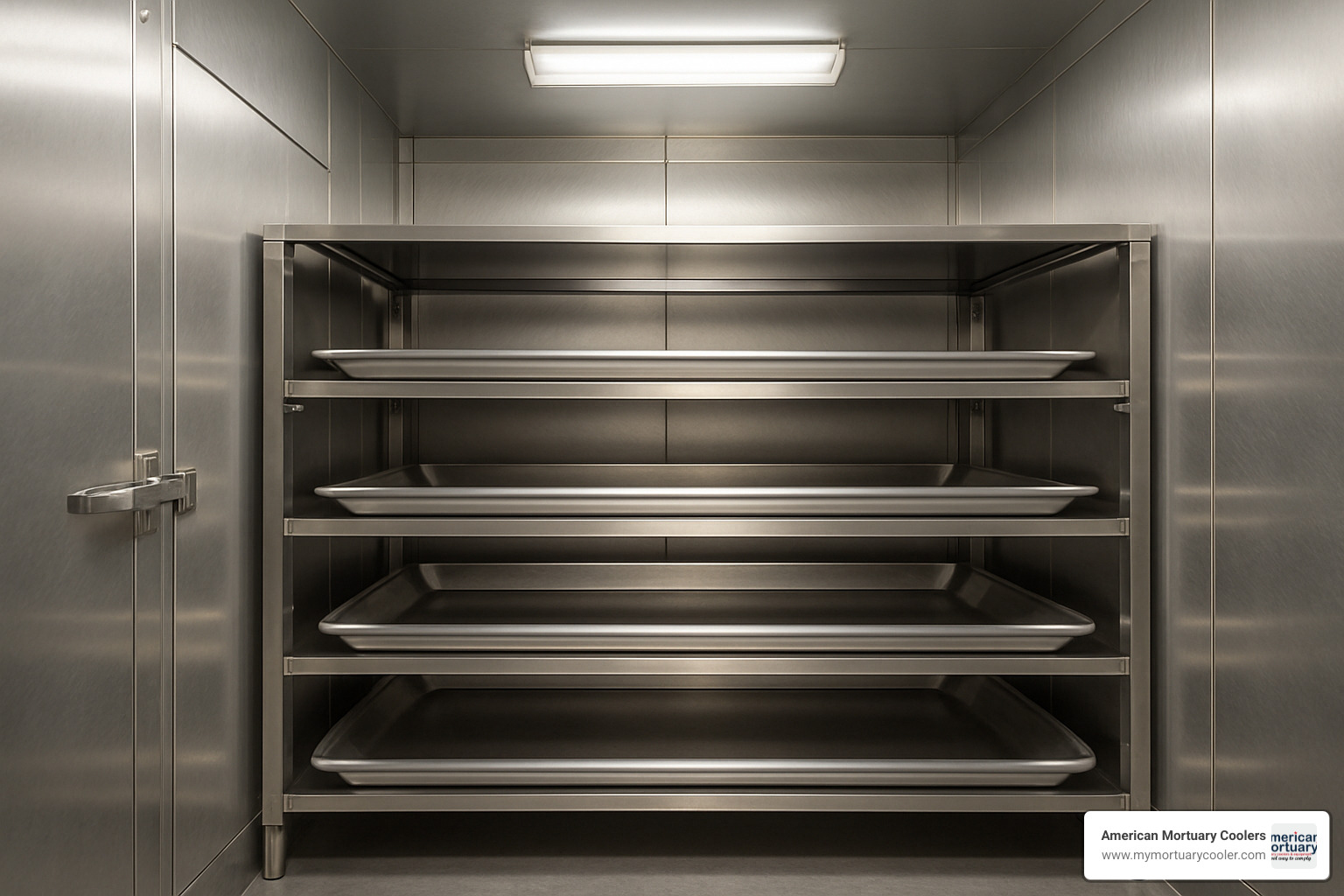
Power redundancy isn't optional in our industry—it's essential. We've seen the heartbreaking consequences when refrigeration fails, both for the dignity of the deceased and for the families they serve. Every unit we install includes recommendations for backup power solutions, whether that's automatic transfer switches connecting to generator power, comprehensive alarm systems alerting staff to temperature changes, or battery backups maintaining critical monitoring during brief outages.
The cautionary tale from Egypt where "a man kept his cousin's body in refrigerator for 9 years after killing him, only to be finded when power outages caused the freezer to break down" illustrates the inevitable failure of improvised storage. Even criminal concealment eventually fails when proper equipment and power redundancy are absent.
More info about morgue cooler options
Key Specifications Checklist
The difference between professional-grade mortuary refrigeration and inadequate alternatives comes down to technical specifications that might seem minor but make all the difference in performance.
Insulation quality stands at the top of our checklist. Our units feature expanded or extruded polystyrene with R-values exceeding 20, maintaining temperature stability while keeping energy costs manageable. This superior insulation is why a body in refrigerator storage remains at precisely the temperature needed for preservation, not fluctuating with the ambient room temperature or external weather conditions.
Regulatory compliance isn't negotiable in our industry. Every American Mortuary Cooler meets NSF and UL standards for sanitation and electrical safety—certifications that household refrigerators simply don't have. These standards ensure the unit can be properly sanitized between uses and operates safely in environments where staff safety is paramount.
"The hardware might seem like a small detail until you're opening that door multiple times daily for years," notes our Technical Director. That's why we use only heavy-duty chrome-plated hardware and slide-out shelving designed specifically for the weight and dimensions of human remains. Our gaskets create an airtight seal that maintains temperature and humidity while preventing odor release—a critical feature in facilities where family members may be present.
Our standard warranty coverage includes 15 years on panels and doors, 5 years on mechanical components, and 2 years on labor. This exceeds industry standards and reflects our confidence in equipment built specifically for the demanding conditions of mortuary operations.
Proper drainage systems for condensation and cleaning might not be the first feature you consider, but they become critically important during routine maintenance. Many of our units feature 100% self-contained refrigeration systems requiring no external drainage—perfect for locations with limited plumbing access.
When to Upgrade Your Facility
How do you know when it's time to invest in new refrigeration equipment? Several clear indicators should prompt a conversation about upgrading.
If your facility regularly operates at 80% capacity or higher, you're walking a dangerous line. I'll never forget the funeral director in Memphis who called us in a panic during a winter flu outbreak—his two-body unit couldn't handle the sudden increase, forcing him to make arrangements with a neighboring facility at considerable expense and inconvenience to families.
Most professional mortuary refrigeration systems have a 15-20 year service life. Units approaching this age typically show decreased efficiency and reliability even with regular maintenance. The compressors work harder, gaskets begin to fail, and temperature fluctuations become more common—all compromising the preservation of remains.
Regulatory changes can sometimes necessitate upgrades. Several states have recently updated their requirements for temperature monitoring and documentation, rendering older systems non-compliant despite still functioning mechanically.
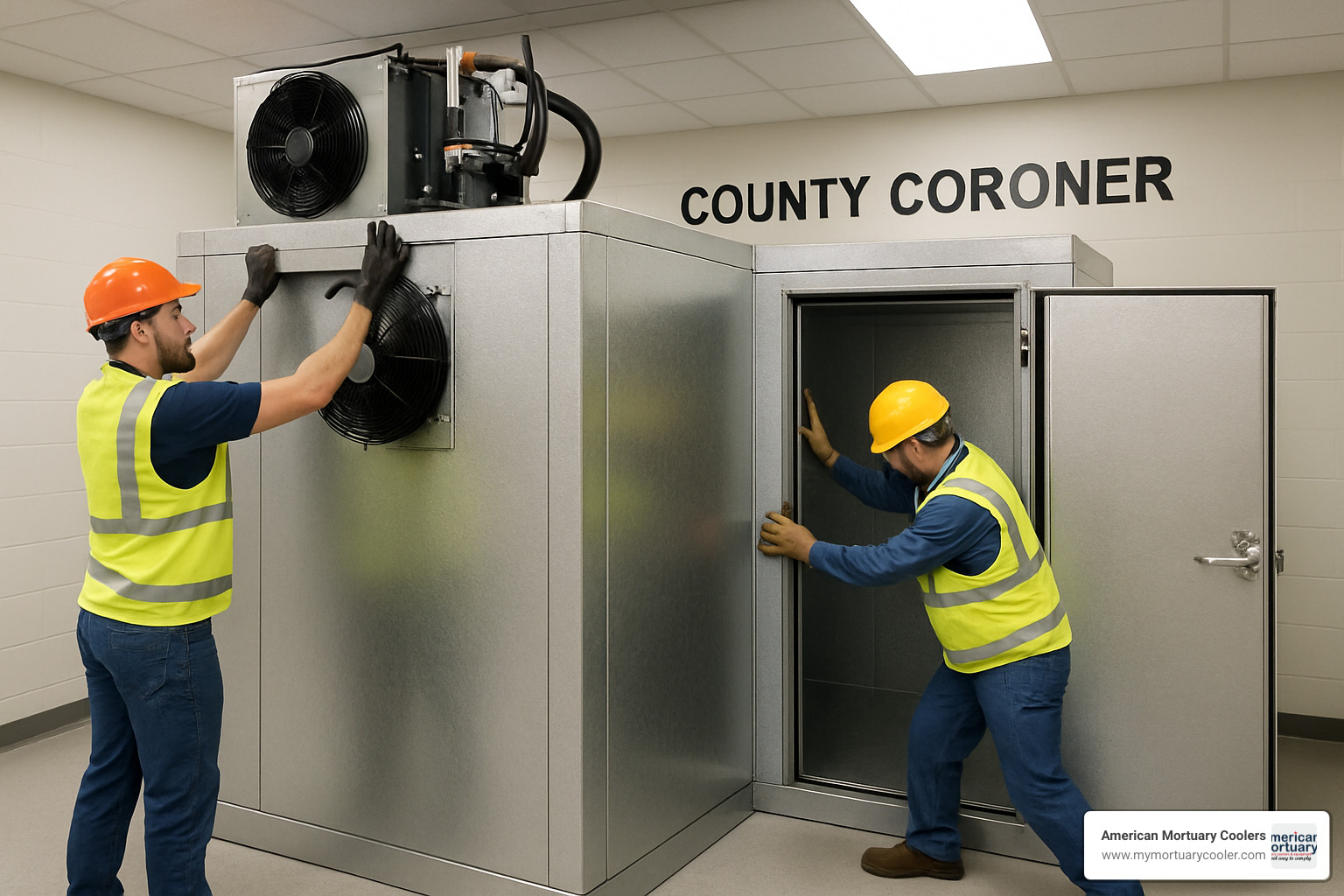
A particularly compelling case came from our Columbia, SC location, where a county coroner had relied on a 25-year-old walk-in cooler that repeatedly failed during humid summer months. After one particularly difficult incident where remains had to be temporarily transferred to a neighboring county, they invested in a new system with redundant cooling and remote monitoring. Not only did this provide peace of mind, but it reduced their energy costs by nearly 40%—savings that justified the upgrade in just a few years.
Community disaster planning has taken on new urgency following recent events. The COVID-19 pandemic saw many facilities scrambling for temporary refrigeration solutions that could have been addressed through proper planning. Having adequate capacity isn't just good business—it's good community service.
"Don't wait for a failure to consider upgrading," our Technical Director often advises clients. "The cost—both financial and in terms of dignity for the deceased—is always higher in an emergency."
Frequently Asked Questions about Body Refrigeration
How long can a body safely remain refrigerated before burial?
When families ask us this question at American Mortuary Coolers, we explain that proper professional refrigeration buys them valuable time to make arrangements. With our mortuary units maintaining that perfect 2-5°C (35-41°F) sweet spot and 85% humidity, a body can be preserved for about a week before noticeable changes begin.
This week-long window gives families breathing room to notify distant relatives, arrange services, and process their grief without rushing important decisions. Many of our funeral home clients tell us this timeline meets the needs of most families they serve.
For situations requiring longer preservation, additional steps become necessary. Embalming is the traditional choice for extended viewings or delays, while freezing at -20°C (-4°F) works for certain medical examiner cases or when families need significant postponements for religious or logistical reasons.
I remember a case where a hospital in North Dakota needed to preserve remains for nearly two weeks during a severe winter storm that prevented family from traveling. Their American Mortuary Cooler maintained perfect conditions throughout, allowing for a meaningful viewing when the family finally arrived – something that would have been impossible without proper equipment.
Of course, this timeline assumes uninterrupted refrigeration in a professional unit. Even the Egyptian case where "a man kept his cousin's body in a freezer for 9 years" eventually failed when power outages occurred, showing that no method provides indefinite preservation.
Can a standard kitchen refrigerator legally store human remains?
The short answer is absolutely not – and we're quite firm about this when people ask. Standard household refrigerators cannot legally store human remains under any circumstances in the United States.
Only licensed facilities like funeral homes, hospitals, medical examiners' offices, and certain research institutions have legal authorization to store human remains, and they must use equipment specifically designed for this purpose.
Beyond the legal issues, household refrigerators fail at body preservation for several crucial reasons:
Their temperature fluctuates wildly, especially when doors open. They provide zero humidity control, causing tissue dehydration. They're not designed to contain biohazards safely. The shelving wasn't built to support human weight. And perhaps most importantly, they can't be properly sanitized between uses – something that makes me shudder when I think about it.
Using a household refrigerator for a body in refrigerator situation can result in serious criminal charges. In multiple cases we've studied, individuals faced "desecration of human remains" charges on top of any homicide-related offenses. The legal system takes proper handling of the deceased very seriously, as it should.
What temperature alarms are mandated for funeral homes?
"The call that wakes you at 2 AM about a cooler failure is the one you never want to get," a funeral director in Memphis once told me. That's why temperature monitoring systems aren't just a good idea – they're increasingly required by law.
While requirements vary by state, most jurisdictions now require funeral homes to have temperature monitoring systems with alarm capabilities. These typically must alert staff when temperatures drift more than 2°C from the set point – a small window that can make a big difference in preservation quality.
Modern systems we install at American Mortuary Coolers include features that bring peace of mind:
Local alarms that sound in the building when temperatures shift. Remote notifications that send text messages or emails to staff phones. Automated logging that creates documentation for regulatory compliance. And battery backups that keep alarm functions working even during power outages.
Some states have gotten stricter recently, requiring facilities to maintain temperature logs for inspection during regulatory visits. Our digital systems generate these automatically, saving staff time while providing more accurate records than manual checks.
I'm reminded of the Brooklyn case where "human remains were finded in a refrigerator and freezer" concealing a body for nearly two years. Without proper monitoring and professional equipment, problems eventually surface – whether through mechanical failure, odor, or investigation. Professional equipment with proper monitoring prevents these tragic situations and maintains the dignity every person deserves after death.
Conclusion
The science and ethics of proper body in refrigerator storage reflect our society's commitment to dignity in death. While criminal cases make headlines when refrigeration is misused, the vast majority of mortuary refrigeration serves essential, legitimate purposes in the death care industry.
When we think about what proper mortuary refrigeration provides, it's really about giving families the gift of time – time to gather from across the country, time to process their grief, and time to make thoughtful arrangements without rushing through important decisions. For medical examiners and investigators, it's about preserving crucial evidence that might otherwise be lost to nature's inevitable processes. And for all of us, it's about maintaining public health through proper containment while ensuring the deceased are treated with the respect they deserve.
At American Mortuary Coolers, we don't just build refrigeration units – we create solutions that honor the final chapter of a person's story. Our Tennessee craftspeople take pride in every custom-built cooler, knowing it will serve funeral directors, medical professionals, and families during some of life's most challenging moments.
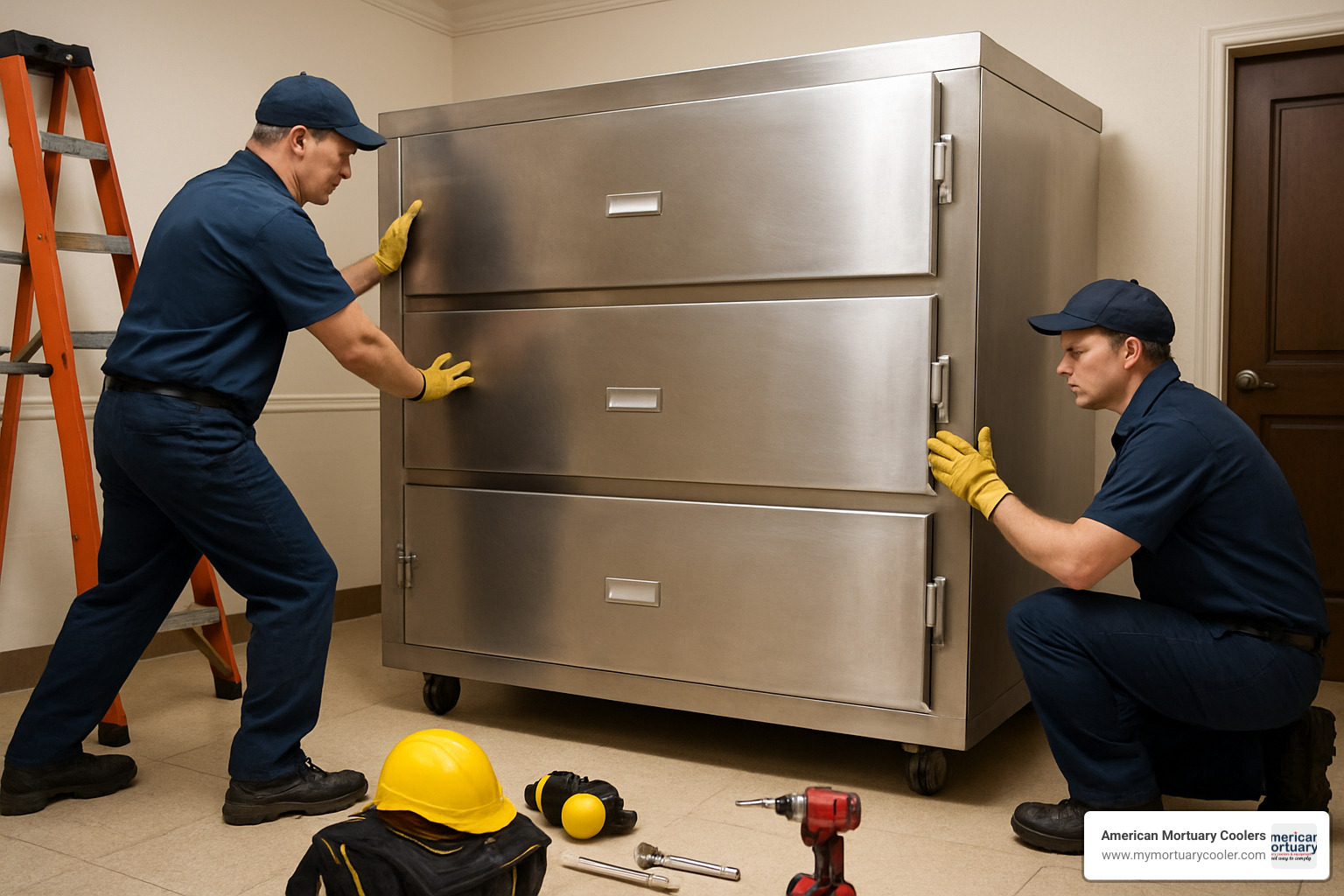
We understand that when you call us about mortuary refrigeration, you're not just looking for equipment – you're looking for peace of mind. That's why our regional support teams across all 48 contiguous states are ready to help with everything from initial design to installation and maintenance. We believe that proper care for the deceased is both a technical challenge and an ethical responsibility, and we design our systems with the durability, precision, and features to meet both needs.
Whether you're planning a brand-new facility, replacing aging equipment that's seen better days, or adapting to changing regulations, we'd love to have a conversation about your specific needs. Our specialists bring decades of combined experience to help you steer the technical details while keeping sight of what matters most – ensuring those in your care receive the dignity and respect they deserve, even in death.
















